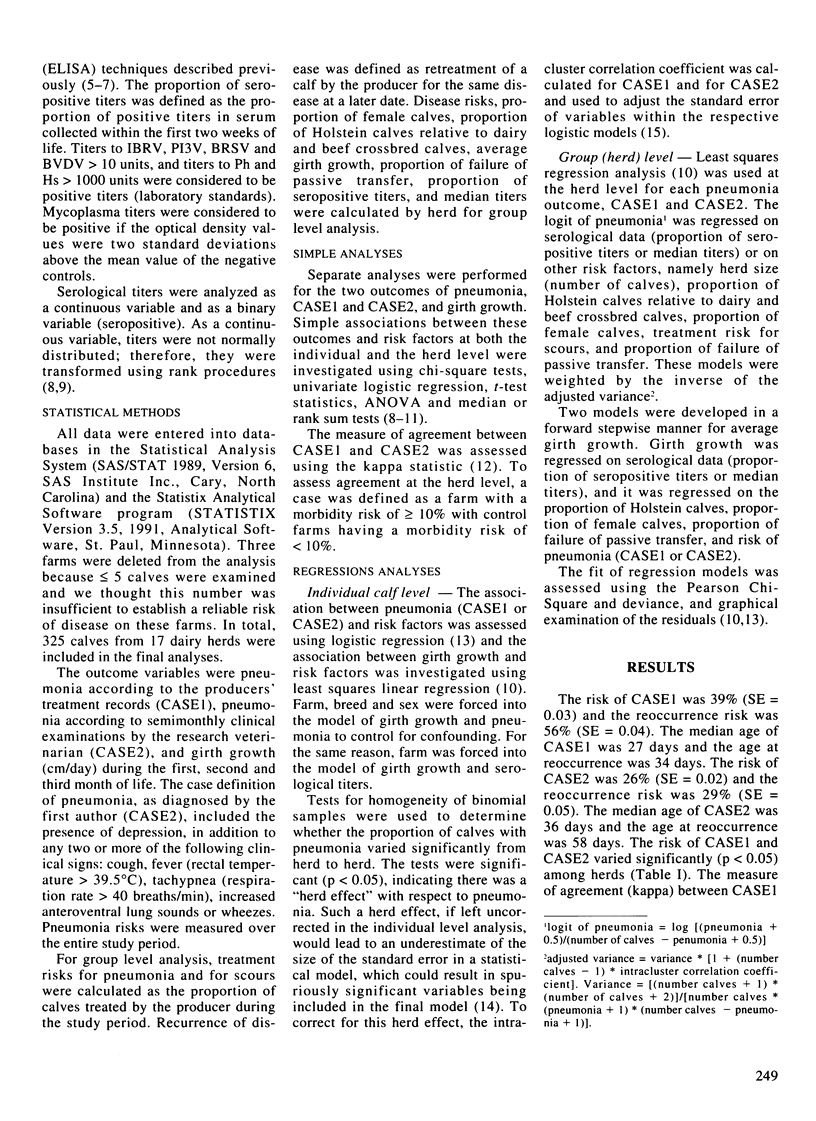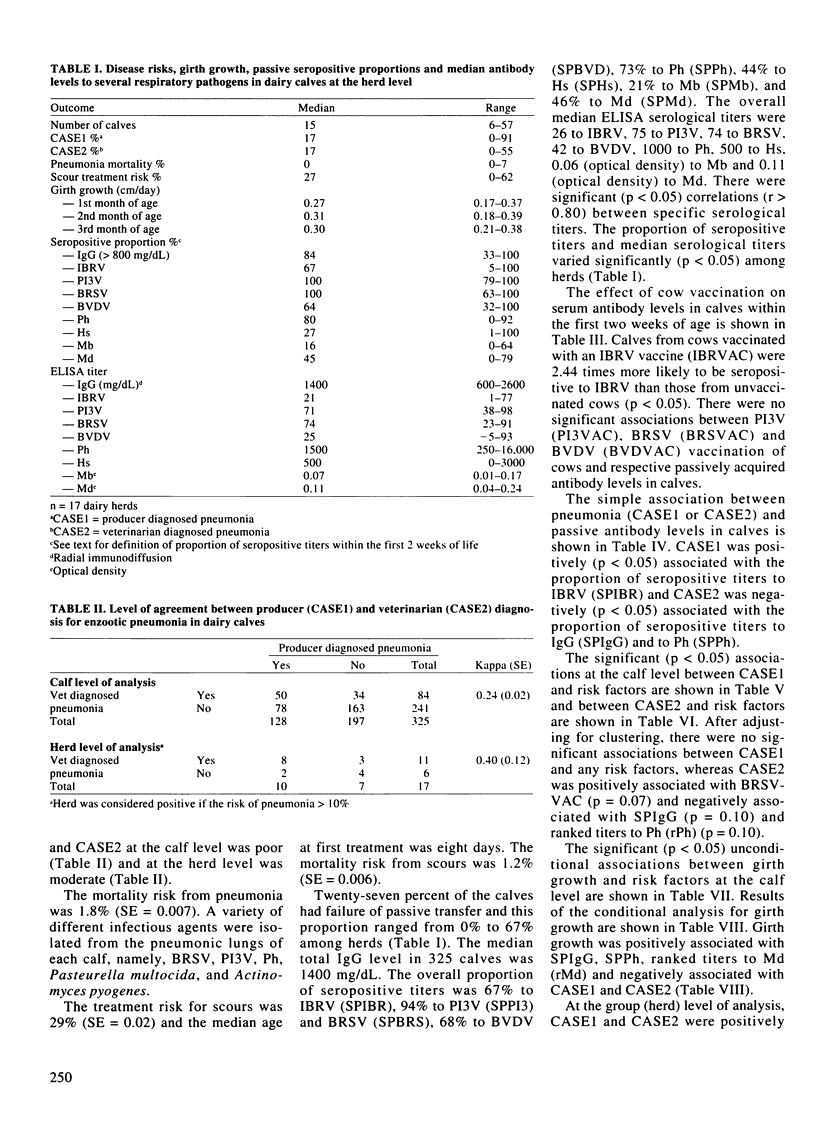Abstract
A field study involving 325 calves from 17 dairy herds in Saskatchewan was conducted to determine the risk of enzootic pneumonia and to assess its association with a number of factors. Two different case definitions of pneumonia were used in the analyses: the first was based on producers' treatment risk (CASE1) and the second was based on semimonthly clinical examinations of calves by the research veterinarian (CASE2). The risk of pneumonia based on CASE1 was 39% and on CASE2 was 29%. The measure of agreement between CASE1 and CASE2 at the calf level of analysis was poor (kappa = 0.24, SE = 0.02) and at the herd level of analysis was moderate (kappa = 0.40, SE = 0.12). The mortality risk from pneumonia was 1.8% and a variety of infectious organisms were isolated from pneumonic lungs. Twenty-seven percent of the calves had inadequate (total IgG < or = 800 mg/dL) levels of passively acquired antibodies as measured by radial immunodiffusion. The proportion of seropositive titers in calves within the first two weeks of age was 94% to parainfluenza 3 virus (PI3V) and bovine respiratory syncytial virus (BRSV), 73% to Pasteurella haemolytica (Ph), 68% to bovine viral diarrhea virus (BVDV), 67% to infectious bovine rhinotracheitis virus (IBRV), 46% to Mycoplasma dispar (Md), 44% to Haemophilus somnus (Hs), and 21% to Mycoplasma bovis (Mb). At the calf level of analysis and after adjusting for clustering, there was a negative association (p = 0.10) between the diagnosis of pneumonia based on CASE2 and total IgG levels and Ph titers (rPh).(ABSTRACT TRUNCATED AT 250 WORDS)
Full text
PDF







Selected References
These references are in PubMed. This may not be the complete list of references from this article.
- Allen J. W., Viel L., Bateman K. G., Nagy E., Røsendal S., Shewen P. E. Serological titers to bovine herpesvirus 1, bovine viral diarrhea virus, parainfluenza 3 virus, bovine respiratory syncytial virus and Pasteurella haemolytica in feedlot calves with respiratory disease: associations with bacteriological and pulmonary cytological variables. Can J Vet Res. 1992 Oct;56(4):281–288. [PMC free article] [PubMed] [Google Scholar]
- Baker J. C., Werdin R. E., Ames T. R., Markham R. J., Larson V. L. Study on the etiologic role of bovine respiratory syncytial virus in pneumonia of dairy calves. J Am Vet Med Assoc. 1986 Jul 1;189(1):66–70. [PubMed] [Google Scholar]
- Boothby J. T., Jasper D. E., Rollins M. H., Thomas C. B. Detection of Mycoplasma bovis specific IgG in bovine serum by enzyme-linked immunosorbent assay. Am J Vet Res. 1981 Jul;42(7):1242–1247. [PubMed] [Google Scholar]
- Corbeil L. B., Watt B., Corbeil R. R., Betzen T. G., Brownson R. K., Morrill J. L. Immunoglobulin concentrations in serum and nasal secretions of calves at the onset of pneumonia. Am J Vet Res. 1984 Apr;45(4):773–778. [PubMed] [Google Scholar]
- Davidson J. N., Yancey S. P., Campbell S. G., Warner R. G. Relationship between serum immunoglobulin values and incidence of respiratory disease in calves. J Am Vet Med Assoc. 1981 Oct 1;179(7):708–710. [PubMed] [Google Scholar]
- Donald A., Donner A. Adjustments to the Mantel-Haenszel chi-square statistic and odds ratio variance estimator when the data are clustered. Stat Med. 1987 Jun;6(4):491–499. doi: 10.1002/sim.4780060408. [DOI] [PubMed] [Google Scholar]
- Durham P. J., Hassard L. E., Van Donkersgoed J. Serological studies of infectious bovine rhinotracheitis, parainfluenza 3, bovine viral diarrhea, and bovine respiratory syncytial viruses in calves following entry to a bull test station. Can Vet J. 1991 Jul;32(7):427–429. [PMC free article] [PubMed] [Google Scholar]
- Harland R. J., Potter A. A., van Drunen-Littel-van den Hurk S., Van Donkersgoed J., Parker M. D., Zamb T. J., Janzen E. D. The effect of subunit or modified live bovine herpesvirus-1 vaccines on the efficacy of a recombinant Pasteurella haemolytica vaccine for the prevention of respiratory disease in feedlot calves. Can Vet J. 1992 Nov;33(11):734–741. [PMC free article] [PubMed] [Google Scholar]
- Howard C. J., Clarke M. C., Brownlie J. Protection against respiratory infection with bovine virus diarrhoea virus by passively acquired antibody. Vet Microbiol. 1989 Mar;19(3):195–203. doi: 10.1016/0378-1135(89)90066-7. [DOI] [PubMed] [Google Scholar]
- Kimman T. G., Zimmer G. M., Westenbrink F., Mars J., van Leeuwen E. Epidemiological study of bovine respiratory syncytial virus infections in calves: influence of maternal antibodies on the outcome of disease. Vet Rec. 1988 Jul 23;123(4):104–109. doi: 10.1136/vr.123.4.104. [DOI] [PubMed] [Google Scholar]
- Marshall R. G., Frank G. H. Clinical and immunologic responses of calves with colostrally acquired maternal antibody against parainfluenza-3 virus to homologous viral infection. Am J Vet Res. 1975 Aug;36(08):1085–1089. [PubMed] [Google Scholar]
- Martin S. W., Bateman K. G., Shewen P. E., Rosendal S., Bohac J. G., Thorburn M. A group level analysis of the associations between antibodies to seven putative pathogens and respiratory disease and weight gain in Ontario feedlot calves. Can J Vet Res. 1990 Jun;54(3):337–342. [PMC free article] [PubMed] [Google Scholar]
- Mechor G. D., Rousseaux C. G., Radostits O. M., Babiuk L. A., Petrie L. Protection of newborn calves against fatal multisystemic infectious bovine rhinotracheitis by feeding colostrum from vaccinated cows. Can J Vet Res. 1987 Oct;51(4):452–459. [PMC free article] [PubMed] [Google Scholar]
- Miller W. M., Harkness J. W., Richards M. S., Pritchard D. G. Epidemiological studies of calf respiratory disease in a large commercial veal unit. Res Vet Sci. 1980 May;28(3):267–274. [PubMed] [Google Scholar]
- Robison J. D., Stott G. H., DeNise S. K. Effects of passive immunity on growth and survival in the dairy heifer. J Dairy Sci. 1988 May;71(5):1283–1287. doi: 10.3168/jds.S0022-0302(88)79684-8. [DOI] [PubMed] [Google Scholar]
- Rosendal S., Martin S. W. The association between serological evidence of mycoplasma infection and respiratory disease in feedlot calves. Can J Vet Res. 1986 Apr;50(2):179–183. [PMC free article] [PubMed] [Google Scholar]
- Speicher J. A., Hepp R. E. Factors associated with calf mortality in Michigan dairy herds. J Am Vet Med Assoc. 1973 Mar 15;162(6):463–466. [PubMed] [Google Scholar]
- Van Donkersgoed J., van den Hurk J. V., McCartney D., Harland R. J. Comparative serological response in calves to eight commercial vaccines against infectious bovine rhinotracheitis, parainfluenza-3, bovine respiratory syncytial, and bovine viral diarrhea viruses. Can Vet J. 1991 Dec;32(12):727–733. [PMC free article] [PubMed] [Google Scholar]


